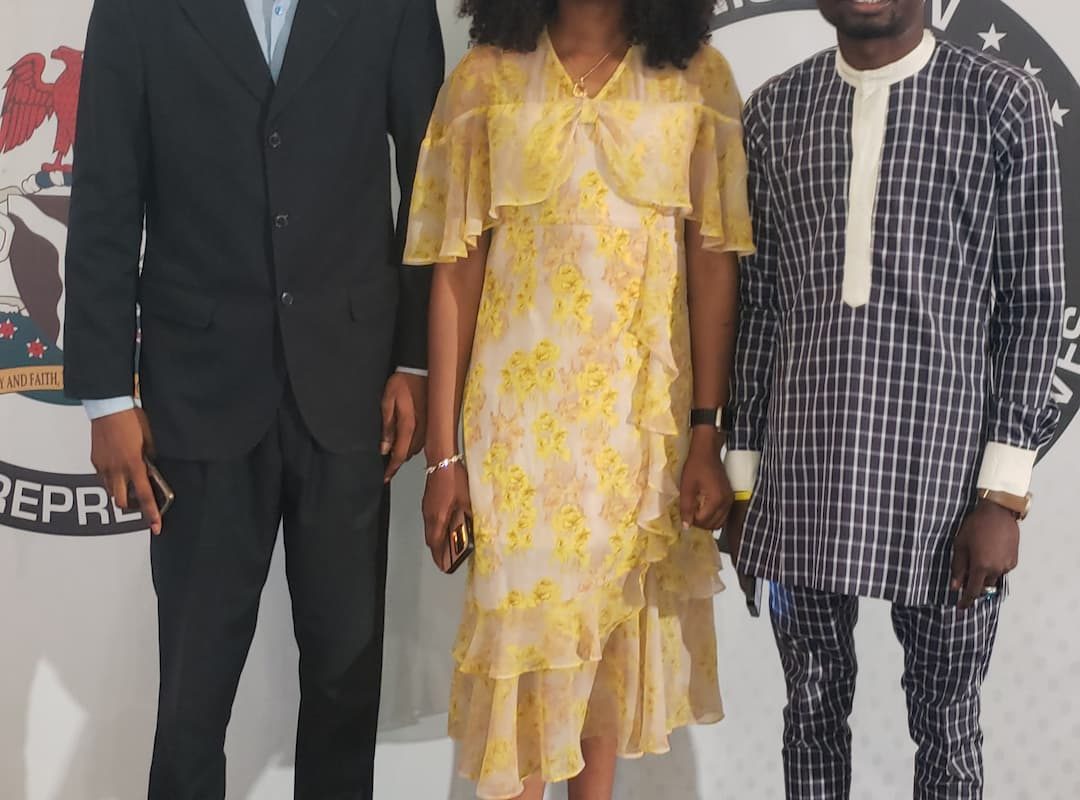“Many are called, but few are chosen” has come to be recognised as the unofficial tagline for the MVP Hall of Fame. Find out the story behind the historic move in this chat with the Founder of OrderPaper.
DOWNLOAD: The MVP Hall of Fame Publication (Semifinal Edition)

In a bid to strengthen legislative accountability and promote improved service delivery in the National Assembly, OrderPaper has been tracking lawmakers’ performance in both chambers of the Ninth National Assembly since its first anniversary in 2020.
OrderPaper’s Annual Appraisal of the 469-member National Assembly for at least three years now, is focused exclusively on the core legislative function of law-making and essentially applies the Value, Impact, and Productivity criteria in rating those shortlisted contributions. This series of unprecedented, independent, and thorough data-driven annual performance appraisals of the National Assembly further heralds the induction of the best-performing lawmakers into the Most Valuable Parliamentarian (MVP) Hall of Fame.
Having put in the hard work of identifying and shortlisting a distinct class of legislators who have proven to be performance-driven, excellence-inspired and public-spirited for a possible induction into this invitation-only arena, OrderPaper Nigeria is set to unveil and induct the successful finalists this Sunday.
At the centre of this huge project, however, is Oke Epia; leading the way and the team working to ensure that exemplary leadership in the institution of parliament is applauded and encouraged. We had a sit-down with the Public Policy Advisor, where he shared first-hand knowledge of the history behind the initiative and the journey towards unveiling Nigeria’s first-ever Hall of Fame for Members of Parliament (MPs).
Q: The MVP Hall of Fame event is around the corner. For the sake of those with little or no insight into what this is all about, can you give us a brief history of it?
OrderPaper has, since the commencement of the Assembly in 2019, begun to monitor very closely the activities and the service delivery functions of the National Assembly, members of the Senate and Members of the House of Representatives. Specifically around the functions of lawmaking, which is processed through bills. So we had begun to measure the performances of the 109 senators and the 360 members of the House of Representatives with regard to the sponsorship and processing of bills.
And so, for the first anniversary in 2020, the second anniversary in 2021 and, of course, the third anniversary in 2022. On every such occasion, we provided an appraisal of the National Assembly with respect to lawmaking. By the way, these are performance appraisals driven completely by what the data provides. In other words, they are completely data-driven. They’re not performance measurements on whims and caprices because we are a parliament-focused organisation.
The only thing we do is the Parliament of Nigeria; we drink, sleep, eat, and wake up with it in our thoughts and our minds. What we have done over time, therefore, is to put together a number of bills that have been proposed by the National Assembly. So in the first year, that was basically the approach. By the second year, we had to also keep aggregating that sponsorship of bills, but then we decided to advance it down the line beyond the numbers.
What do the bills say, what do they want to achieve, and what are the focus and objectives of these bills? In other words, what is the value inherent in these bills proposed by members of the National Assembly? Do they have any impact on the lives and living conditions of citizens? What socio-economic sectors are involved or covered or are impacted by these bills? Do these bills advance the core mandate of the administration in power?
READ ALSO: OrderPaper Founder, Oke Epia, is Nigeria’s Most Influential Think Tank CEO
The President Muhammadu Buhari administration anchors its mandate on three core areas: the fight against corruption, revitalising the economy and addressing the ravaging insecurity across the country. Underpinning the propositions of legislation and the processes; in other words, the lawmaking functions of the 9th National Assembly. Has it aligned with the mandate of the Buhari administration?
“People can actually just sponsor bills, and nothing happens or sponsor bills just for the sake of having their names on bills. So we decided to extend the evaluation to cover value and impact.”
– Oke Epia, Founder and Executive Director, OrderPaper Nigeria
In looking beyond the number of bills, we decided to anchor the relevance, value and impact of these bills in that respect; so that because we have received feedback, especially from our working in the first and second anniversaries, that it’s not just the numbers. People can actually just sponsor bills, and nothing happens or sponsor bills just for the sake of having their names on bills. So we decided to extend the evaluation to cover value and impact.
Another critical area of evaluation or metric that we also decided on, out of experience and to make it a robust measurement and mechanism, was the extent of processing of these bills. So where have these bills gotten to in the bill processing stages of the legislature? You have at least six processes for a bill to become law, so the proposition of a bill at first reading when it is just mentioned qualifies anyone to be measured, but where have these bills been progressed to in the legislative mill?
Have they moved beyond the first reading? Have they been debated in plenary and scaled second reading? Have they been taken through plenary, committee processing, brought back to plenary and adopted for third reading and then passed by the House of Representatives or the Senate, as the case may be?
Has the bill advanced to the other chambers for concurrence? Has it been transmitted to the President for assent? Has it received assent if it has been transmitted, or was it returned? All of these are what we call the Productivity Index of the bills. Looking at these, we had therefore put together what we call the VVIP metrics of performance measurements with respect to lawmaking. In summary, the VVIP refers to the volume, value, impact and progression of these bills.
READ ALSO: MVP Hall of Fame: OrderPaper unveils Scorecards for Ninth National Assembly
Looking at these bills through the metrics, we have been able to measure the performances of all the 469 members of the National Assembly with respect to lawmaking. In getting that measurement done, we decided that since this is where we are going, why don’t we put a measure in place to recognise and probably highlight best performances to encourage others and promote legislative strengthening? This explains why we designed the Most Valuable Parliamentarian Hall of Fame.
“…the proposition of a bill at first reading, when it is just mentioned, qualifies anyone to be measured, but where have these bills been progressed to in the legislative mill?”
We are, for the first time in the history of this country, and I dare say across the continent of Africa, instituting a framework that will allow for only ‘the best of the best members of the National Assembly’ in terms of excellence-driven performance, being public-spirited, deliver services, impacts on the lives and living conditions of Nigerians and also seek to improve the socio-economic indices of the country. We decided to design the Most Valuable Parliamentarian Hall of Fame (MVP), celebrate those lawmakers, and induct them into a Hall of Fame.
Since the midterm (second year) of the Ninth National Assembly, we have begun to talk about it and use it as a measure for better performance by members of the National Assembly. We have been curating the data, and making the measurements. At midterm, we were able to have a nomination for a possible shortlist into the MVP Hall of Fame. So we had about 55 of the 469 members of the National Assembly across the Senate and the House of Representatives nominated for possible induction; the target being at the end of the Assembly in June 2023.
Nomination at that time was largely anchored on volume because, at that time, we still had a lot of the criteria evolving. We needed to encourage more people; the focus was on the numbers. How many bills has one been able to sponsor and all of that? We now moved beyond that and did the appraisal of the National Assembly to emphasise the metrics of value, impact and, of course, progression. Using these combined metrics, we have a clearer picture of those pre-qualified for induction into the Hall of Fame, so we were able to shortlist from that 55 to slightly over 20 who were now shortlisted as semifinalists.
READ ALSO: MVP Hall of Fame: At least 20 NASS Members, make Semifinal shortlist
I think it was in April that we made the announcement of individuals across the National Assembly who have distinguished themselves to that extent for possible induction. Now, we continue to work with the data, analyse and continue to process them and I must make the point that when we started to do this, we saw responses from members of the National Assembly – in the House of Representatives and Senate.
The data that we released for our performance appraisals began to incentivise performances and some lawmakers to say: “Oh, I’ve not done too well and I need to do better.” So, we see members of the National Assembly responding to the call, and in that sense, we saw a competition by members of the National Assembly to come up in the rating. I do not want to say outdo each other but some sort of healthy rivalry.
As far as we know, as far as we could see, we saw situations where people who didn’t do well in year one come up in the rating, year two and year three come up to be recognised in the rating. We had a situation whereby people who were not initially nominated at midterm came up struggling and joined the semi-final shortlist. That is an indication of the impactful work we have done in the 9th Assembly and what it has created amongst members of the National Assembly.
This is the situation where the final inductees will be unveiled on the 21st of May in Abuja. We see situations where it is only the Best of the Best in this semi-final shortlist that will be inducted, and as we said in the beginning: “Many are called, but few are chosen.” So we will see a very reduced number out of those that qualified that will be unveiled and inducted on the 21st of May in Abuja.
Read the concluding part of this interview series on our website.
“We had a situation whereby people who were not initially nominated at midterm came up struggling and joined the semi-final shortlist. That is an indication of the impactful work we have done in the 9th Assembly and what it has created amongst members of the National Assembly.”
READ ALSO: OrderPaper Nigeria: 22 Moments and Milestones of 2022



